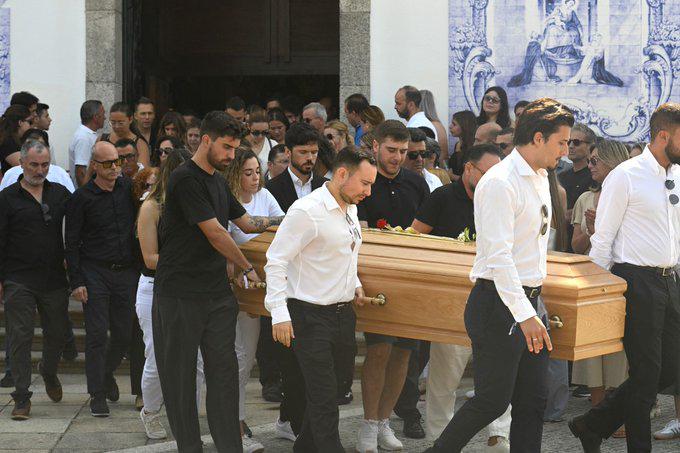
Lasisi Olagunju
“There is a kind of price for life,” says Charles A. Curran, and that price, he says, “moves in the direction of death.”
Death blows no trumpet but we all know it is coming. It is the unalterable final part of the process of life. Some of us spend our entire life worrying about death; some simply ignore it; some mortally fear it; some calmly look forward to it. Whichever you and I choose, the final portion is that we all have to die one way or the other. It is destiny at work.
In the afternoon of Thursday last week, I was with the Orangun of Oke Ila, Oba Adedokun Abolarin, who lost his wife, Olori Solape Christianah Abolarin, exactly one week today. She was 51 years old.
I knew her; she was my wife’s friend and colleague in the civil service of Osun State. Her death has made us poorer here. If anyone had asked the dead what she thought was next in her life, she would probably have said she looked forward to becoming a permanent secretary. Her diligence at work was preparing her for the top job. For her, death was too far-fetched to consider. She had so much ahead, and a lot in her plate to attend to. But she died. We all mourn her untimely passage.
“We care, God cures” is a bold inscription on the wall of a popular hospital in Ibadan. A very sensible thing for every person and physician to say is in that message. No matter the degree of care, people die, some young, some old. Probe certain ailments; for women, for instance, probe fibroids: “The exact cause is unknown” is what comes up. Modern medicine and its prophets get confounded now and then despite humanity’s progress across centuries. That is why since the beginning of creation, women anatomy and freak deaths appear together, constantly holding hands. German physician, Eucharius Roesslin (1470-1526) told his readers in 1513 that “very many (are) the perils, dangers, and throngs which chance to women…” Read about him and why he wrote his ‘Der Rosengarten’ (The Rose Garden), later translated to ‘The Birth of Mankind’.
The death of our king’s wife reminds the mindful of a hugely cerebral editor, columnist and Queen of Letters, MEE (May Ellen Ezekiel). Married to Richard Mofe Damijo, MEE died after a fibroid surgery on 23 March, 1996 in the best hospital of her day in Lagos. She was aged 40. The uterine course (and cause) of her transition was identical with this exit in Osun State. The stabbing pains of the whys, till eternity, rack the brain.
Amidst a torrent of personal grief and familial lamentations, Oba Abolarin reeled out the pearls of his companionship with the departed Olori: “Many of the things people praise in me, she was the architect. Everyone who was my person was accepted by her as her person. She was mother to all the boys and girls in our college. She made our home cosy for orphans. She was from Igbeti in Oyo State, she married me and became completely Oke Ila and Osun State …” The king’s men and women in attendance nodded in agreement.
The grieving oba went on and on punctuating prayers from visitors and friends with tales of the great bond he shared with the departed. Hearing him and looking at the histrionics that accompanied what he was saying reminded me of a passage on intimacy, death, and grief: “…with a person’s death and our experiences of grief comes…the clearest view of what that person and relationship have meant to us in life” (Brian tie Vries in ‘Grief: Intimacy’s Reflection’).
When a loved one dies, everyone periodically pauses and queries their efforts. We’ve all lost persons whose death left us to wonder if we did enough to keep them around. I ask myself till tomorrow if I put in everything I should to keep my parents alive despite their very old age. With the deceased’s immediate younger sister beside him retelling, amid sobs, the last-moment stories, I heard Oba Abolarin asking himself repeatedly what he ought to do which he did not do. “I am a finicky person, so what happened?” He asked no one in particular.
Those who experienced it would swear that a spouse’s death is a life-altering experience. They say it is a tough one. I read in Phyllis R. Silverman’s ‘Widowhood and Preventive Intervention’ that during courtship, people commonly rehearse for marriage, but “no similar rituals prepare the individual for the inevitable termination of the marriage when one of the partners will die.”
Between this husband and his late wife is a 12-year-old prince, Tadeniawo. And I heard Kabiyesi asking how he was going to cope going forward: “I am close to 70. How is a 70-year-old man going to take care of a 12-year-old, all alone? The boy was very close to his mum.” The oba said; then he went on and on even as he struggled to put on the visage of courage.
He has to be strong; he is an oba, husband of the whole town. One of the covenants he had with those who had been on the throne before him is that his hard wood must never shed tears. Ako igi kò gbodò s’oje. He has handled it so well so far. We keep praying for him.
“Death, thou shalt die” comes as a verdict from seventeenth-century English poet, John Donne. In that Holy Sonnet, Donne asks ‘Death’ not to be proud because “One short sleep past, we wake eternally,/ And death shall be no more…”
May Olori Abolarin’s soul rest in perfect peace. May God look after her husband and child and all her other loved ones.







































